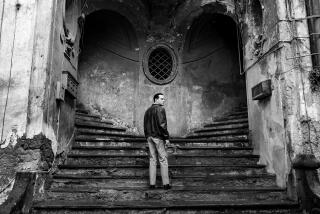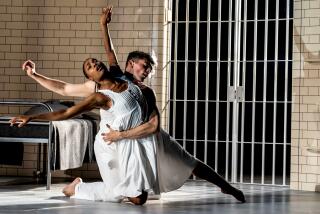HBO’s ‘Rome’ wasn’t built in a day
NEW YORK — At one point during the 14-month, $100-million production of HBO’s new series “Rome,” actor James Purefoy, who plays Mark Antony, was introduced to a group of Italian extras undergoing rigorous boot-camp training to portray Roman soldiers.
The cameras weren’t rolling, and on any other set the moment would have consisted of behind-the-scenes chitchat. But months of immersion in a painstakingly detailed re-creation of the ancient city had its effect. As he stood in a replica of the Forum -- constructed to scale at the renowned Cinecitta Studios in Rome -- Purefoy addressed the men not as himself but as the famed Roman commander. They, in turn, stood sharply at attention, facing him with respectful awe.
“There he was in the Forum, bellowing at these soldiers, and the whole thing was entirely real,” recalled Bruno Heller, writer, co-creator and executive producer of the series. “It was a very strange moment. Everyone felt a shiver.”
HBO is feeling its own nervous shiver in the days leading up to Sunday’s premiere of “Rome.” The premium-cable channel spent seven years developing and producing what may be the most costly 12-episode television series ever, striving to create a portrayal of the Roman Empire so grittily authentic that the city’s ancient inhabitants would have recognized it. The key question, though, is will contemporary audiences embrace this vision?
“Everyone is on tenterhooks to see how it is received,” Heller said.
The large-scale project comes at a key juncture for the network, which has recently had trouble duplicating the water-cooler buzz it generated with such shows as “The Sopranos,” “Sex and the City” and “Six Feet Under.”
With 27.7 million paid subscribers, HBO is highly profitable and still commands the largest audience of pay-cable channels. But its growth has slowed in the last two years as programs like the now-canceled “Carnivale” and the Lisa Kudrow comedy “The Comeback” struggled to draw viewers.
The most talked-about recent addition to the HBO lineup, “Entourage,” has gotten critical acclaim but modest ratings. The finale of “Six Feet Under” last Sunday commanded almost 4 million viewers, far short of the 13.4 million who watched “The Sopranos” at its peak in 2002. The hit mobster drama, which averaged 12.9 million viewers last season, is now expected to end its run in 2007.
Meanwhile, the network must compete with a similar brand of edgy dramatic programs now found on basic cable and network television.
“They were kind of the undisputed leader in the late ‘90s in terms of quality television, and I don’t think they are anymore,” said John Landgraf, president of FX Networks, which has made its mark with such contemporary-themed shows as “Rescue Me” and “Nip/Tuck.”
HBO needs “a series that has long legs to it and generates a kind of buzz, excitement and ratings that ‘The Sopranos’ did,” said Jack Myers, editor of mediavillage.com, a television fan website. “Anything less than exceptional performance has to be considered underperformance.”
Early reviews of the series have been mixed; critics have admired its look and intelligence, but some question whether it has the kind of genre-busting writing and attitude of “The Sopranos,” or its western “Deadwood,” or the compelling quality of the famed 1970s “Masterpiece Theatre” series “I, Claudius.”
HBO executives acknowledge that they no longer have a monopoly on the kind of original programming that first distinguished the channel in the 1990s but reject the notion that their fortunes will rise or fall on the success of “Rome.”
“I don’t think it’s fair to put the burden on this show and say this show has to be the next ‘Sopranos,’ because nothing could really wear that mantle,” said Carolyn Strauss, president of HBO Entertainment.
That said, “Rome” is “something that we think very, very highly of,” she added. “We expect that it will be very successful.”
It remains to be seen whether HBO can do for ancient Romans what it has done for mobsters, cowboys and undertakers. Rival studio executives wonder whether television viewers have an appetite for another swords-and-sandals epic, noting the poor ratings ABC earned for its recent miniseries “Empire.”
“I just don’t know if this is something that feels cutting edge,” said Angela Bromstad, president of NBC Universal Television Studio. But HBO believes it has found a new approach to the 2,000-year-old story, both through the quality of the production and the narrative.
Co-produced with the BBC, “Rome” features all the usual players: Julius Caesar, Pompey Magnus, Mark Antony. But the series also revolves around two soldiers: the severe Lucius Vorenus and his unlikely comrade-in-arms, the garrulous Titus Pullo. Through them, viewers are given a glimpse into the rough-and-tumble life of the plebian class.
“The novel aspect is that it’s about everyday life in a time of great historical import,” Heller said.
To convey everyday details, Heller said he wanted to get away from the “kitsch pastiches” of helmets and swords that have been used to signify the ancient world in other productions. Instead, the producers sought to create a more fully realized version of Roman life, circa 52 BC.
“The more real you make the world, the more real the actors and directors can be in that world,” he said.
No detail was too small; costumes -- more than 4,000 pieces -- were made only out of natural fabrics that would have been available during that period. The temples and streets were painted in vivid colors, based on the original markings uncovered by archeologists at the ruins of Pompeii and Herculaneum.
The crew was delighted when creatures like rats, pigeons, hawks and stray dogs took up occupancy in the 5-acre back lot in Rome where they constructed the set, the largest of its kind.
“I was immediately struck by the fact that they were offering up an antidote to what I describe as ‘Hollyrome,’ the version of Rome we’ve all got in our heads of cleanliness and marble and togas that looked pressed,” said historical consultant Jonathan Stamp, the head of the BBC archeology department, who worked on the project for a year.
Dust and chaos dominate this teeming city. To convey the density of the crowded capital, HBO employed a cast and crew of cinematic scope, assembling 750 actors and extras for a pivotal scene of Caesar’s triumph. Strauss called the production “exhaustive and exhausting.”
The result is a vivid portrayal of a dirty, cacophonous, amoral metropolis steeped in the tumult of the time. There are graphic depictions of both the city’s violence and sex within the first few minutes of the premiere, which features blood-splattered soldiers thrusting fatal blows into their Gallic enemies and the full-frontal nudity of a woman emerging from a post-coitus bath.
Stamp delved deeply into Cicero’s speeches and the plays of Titus Maccius Plautus and Terence to help the cast determine everything from the appropriate way for an upper-class woman to greet a senator to the length of time it would take for a letter to arrive in Rome from an outlying city.
It’s the rare viewer who will appreciate such details, but Stamp said the approach affected “the texture and perhaps the confidence with which the world is presented, and that’s something I think absolutely the viewers will respond to.”
Despite the age of the material, Heller said he believes audiences will be struck by the contemporary feeling of ancient Rome.
“The problems they face are the same we do today: how to build a civil society, how to balance individual rights, employment, kids, money, power,” he said.
And although the producers did not attempt to stress any parallels between the Roman Empire and any modern-day equivalents, Heller added that “the transition of a small republic into a vast empire ... is obviously intensely resonant today.”
For their part, HBO executives are hoping “Rome” will draw audiences for a simpler reason.
“These are well-crafted stories and compelling characters,” Strauss said. “No matter what time period they’re in, we think those elements are magnetic.”
More to Read
The complete guide to home viewing
Get Screen Gab for everything about the TV shows and streaming movies everyone’s talking about.
You may occasionally receive promotional content from the Los Angeles Times.






